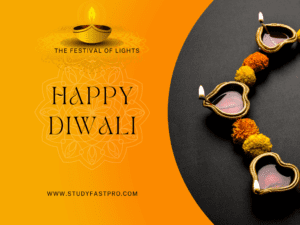Friends in this article we will study Essay on Diwali-Deepawali, Diwali is also known as Deepawali, Dipawali or Deepavali and is one of the most significant festivals celebrated by Hindus across the world. It is a festival of lights that symbolizes the victory of light over darkness and good over evil. The word “Diwali” is derived from the Sanskrit word “Deepavali” which means row of lights. It is celebrated with great enthusiasm and joy across the country. People of different religions and communities also come together to celebrate Diwali.

Diwali is celebrated every year in the month of October or November which depends on the mythology of the Hindu lunar calendar. The festival of Diwali lasts for five days and each day has its unique significance and rituals. The celebrations begin with Dhanteras in which people worship the goddess of wealth, “Goddess Lakshmi”.
The second day of Diwali is called Choti Diwali or Naraka Chaturdashi. It is believed that Lord Krishna defeated the demon Narakasura on this day and freed the world from his tyranny (the cruel and unfair use of power by a person).
The third day is the main day and is commonly known as Diwali or Lakshmi Puja. It is the day when families come together to perform traditional rituals and offer prayers to Goddess Lakshmi which is the goddess of wealth and prosperity. In this day people decorate their homes with Rangoli and light diyas (oil lamps). The entire house is illuminated with decorative lights, candles and lanterns, creating a very attractive sight. Fireworks are also an essential part of Diwali celebrations, people burst firecrackers as a way of expressing their joy and driving away evil spirits. The exchange of gifts and sweets among family members and friends is also a significant part of the festivities.
The fourth day of Diwali is Govardhan Puja which is associated with Lord Krishna, when Lord Krishna lifted the Govardhan Hill to protect the villagers of Mathura from heavy rains and floods.
The fifth and final day of Diwali is called Bhai Dooj. In this day sisters perform puja for the well-being of their brothers and apply a tilak on their foreheads and brothers present gifts to their sisters and promise to protect and support them throughout their lives.
It is also believed that on this day, Lord Rama with his wife Sita and brother Lakshmana returned to Ayodhya after defeating the demon king Ravana and completing his fourteen years of exile. The people of Ayodhya welcomed Lord Rama by lighting thousands of oil lamps that symbolizing the triumph of good over evil and the victory of light over darkness. This tradition of lighting lamps continues to be an integral part of Diwali celebrations.
Another significant aspect of Diwali is the exchange of gifts and sweets among friends, family and neighbours. People visit each other’s homes and exchange greetings and good wishes. The festive spirit of Diwali brings people closer and strengthens social bonds. It is a time for forgiveness, reconciliation and spreading love and happiness.
However, in recent years, the bursting of firecrackers releases harmful pollutants into the air and creates noise pollution which leads to adverse effects on the environment and human health. Many people now opt for eco-friendly alternatives, such as lighting diyas with oil or using decorative electric lights instead of firecrackers.
Frequently asked questions on Essay on Diwali-Deepawali.
Q1: What is Diwali?
Ans: Diwali is also known as Deepavali and is most beautiful festival celebrated by Hindus across the world. It is a joyous occasion that signifies the victory of light over darkness and good over evil.
Q2: When is Diwali celebrated?
Ans: Diwali is celebrated in the Hindu month of Kartik which is usually falls between October and November. The exact date varies each year based on the Hindu lunar calendar.
Q3: What are the eco-friendly alternatives for celebrating Diwali?
Ans: In recent years, there has been a growing concern about the environmental impact by firecrackers. People are encouraged to opt for eco-friendly celebrations by using LED lights and focusing on traditional customs, such as lighting lamps and sharing homemade sweets instead of bursting firecrackers.
Q4: When is Diwali celebrated?
Ans: Diwali is usually celebrated in the month of October or November every year and the exact date of diwali celebration is depends on the Hindu lunar calendar.
Click here to Read